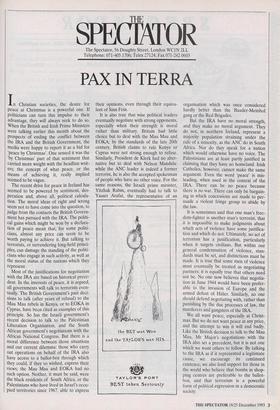SPECTATOR
The Spectator, 56 Doughty Street, London WC1N 2LL Telephone: 071-405 1706; Telex 27124; Fax 071-242 0603
PAX IN TERRA
The recent drive for peace in Ireland has seemed to be powered by sentiment, des- peration and, above all, political calcula- tion. The moral ideas of right and wrong seem not to have come into the question, to judge from the contacts the British Govern- ment has pursued with the IRA. The politi- cal gains which might be won by a declara- tion of peace mean that, for some politi- cians, almost any price can seem to be worth paying to achieve it. But talking to terrorists, or surrendering long-held princi- ples, can damage the standing of the politi- cians who engage in such activity, as well as the moral status of the nations which they represent.
Most of the justifications for negotiation with the IRA are based on historical prece- dent. In the interests of peace, it is argued, all governments will talk to terrorists even- tually. The British Government's past deci- sions to talk (after years of refusal) to the Mau Mau rebels in Kenya, or to EOKA in Cyprus, have been cited as examples of this principle. So has the Israeli government's recent decision to talk to the Palestinian Liberation Organisation, and the South African government's negotiations with the African National Congress. But there is a moral difference between those situations and our current dilemma: those who carry out operations on behalf of the IRA also have access to a ballot-box through which they could, if they so wished, express their views; the Mau Mau and EOKA had no such option. Neither, it must be said, were the black residents of South Africa, or the Palestinians who have lived in Israel's occu- pied territories since 1967, able to express their opinions, even through their equiva- lent of Sinn Fein.
It is also true that wise political leaders eventually negotiate with strong opponents, especially when their strength is moral rather than military. Britain had little choice but to deal with the Mau Mau and EOKA; by the standards of the late 20th century, British claims to rule Kenya or Cyprus were not strong enough to refuse. Similarly, President de Klerk had no alter- native but to deal with Nelson Mandela: while the ANC leader is indeed a former terrorist, he is also the accepted spokesman of people who have no other voice. For the same reasons, the Israeli prime minister, Yitzhak Rabin, eventually had to talk to Yasser Arafat, the representative of an organisation which was once considered hardly better than the Baader-Meinhof gang or the Red Brigades.
But the IRA have no moral strength, and they make no moral argument. They do not, in northern Ireland, represent a majority population straining under the rule of a minority, as the ANC do in South Africa. Nor do they speak for a nation which would otherwise have no voice. The Palestinians are at least partly justified in claiming that they have no homeland. Irish Catholics, however, cannot make the same argument. Even the word 'peace' is mis- leading, when used in the context of the IRA. There can be no peace because there is no war. There can only be bargain- ing in which concessions are made to per- suade a violent fringe group to abide by the law.
It is sometimes said that one man's free- dom-fighter is another man's terrorist, that it is impossible to make judgments about which acts of violence have some justifica- tion and which do not. Ultimately, no act of terrorism has a justification, particularly when it targets civilians. But within our general condemnation of violence, stan- dards must be set, and distinctions must be made. It is true that some men of violence must eventually be treated as negotiating partners; it is equally true that others need not be. No one now believes that negotia- tion in June 1944 would have been prefer- able to the invasion of Europe and the armed defeat of Hitler. Similarly, no one should defend negotiating with, rather than punishing by the due processes of law, the murderers and gangsters of the IRA.
We all want peace, especially at Christ- mas. But we do not want peace at any price, and the attempt to win it will end badly. Like the British decision to talk to the Mau Mau, Mr Major's negotiations with the IRA also set a precedent, but it is not one which we want others to follow. By talking to the IRA as if it represented a legitimate cause, we encourage its continued existence; we also lend support for those in the world who believe that bombs in shop- ping centres are preferable to the ballot- box, and that terrorism is a powerful form of political expression in a democratic society.










































































































 Previous page
Previous page